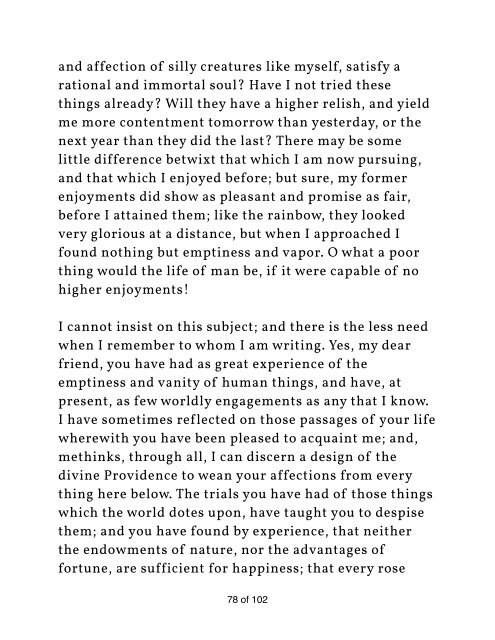The Life of God in the Soul of Man by Henry Scougal
The book instrumental in George Whitefield’s conversion The Life of God in the Soul of Man (1677), was originally written as a private letter to a ‘dear’ friend, to explain Christianity. It was never intended for publication. Yet it has become a classic Puritan text and one of the most read and influential treatises ever written for the comfort of God’s saints.
The book instrumental in George Whitefield’s conversion The Life of God in the Soul of Man (1677), was originally written as a private letter to a ‘dear’ friend, to explain Christianity. It was never intended for publication. Yet it has become a classic Puritan text and one of the most read and influential treatises ever written for the comfort of God’s saints.
You also want an ePaper? Increase the reach of your titles
YUMPU automatically turns print PDFs into web optimized ePapers that Google loves.
and affection <strong>of</strong> silly creatures like myself, satisfy a<br />
rational and immortal soul? Have I not tried <strong>the</strong>se<br />
th<strong>in</strong>gs already? Will <strong>the</strong>y have a higher relish, and yield<br />
me more contentment tomorrow than yesterday, or <strong>the</strong><br />
next year than <strong>the</strong>y did <strong>the</strong> last? <strong>The</strong>re may be some<br />
little difference betwixt that which I am now pursu<strong>in</strong>g,<br />
and that which I enjoyed before; but sure, my former<br />
enjoyments did show as pleasant and promise as fair,<br />
before I atta<strong>in</strong>ed <strong>the</strong>m; like <strong>the</strong> ra<strong>in</strong>bow, <strong>the</strong>y looked<br />
very glorious at a distance, but when I approached I<br />
found noth<strong>in</strong>g but empt<strong>in</strong>ess and vapor. O what a poor<br />
th<strong>in</strong>g would <strong>the</strong> life <strong>of</strong> man be, if it were capable <strong>of</strong> no<br />
higher enjoyments!<br />
I cannot <strong>in</strong>sist on this subject; and <strong>the</strong>re is <strong>the</strong> less need<br />
when I remember to whom I am writ<strong>in</strong>g. Yes, my dear<br />
friend, you have had as great experience <strong>of</strong> <strong>the</strong><br />
empt<strong>in</strong>ess and vanity <strong>of</strong> human th<strong>in</strong>gs, and have, at<br />
present, as few worldly engagements as any that I know.<br />
I have sometimes reflected on those passages <strong>of</strong> your life<br />
wherewith you have been pleased to acqua<strong>in</strong>t me; and,<br />
meth<strong>in</strong>ks, through all, I can discern a design <strong>of</strong> <strong>the</strong><br />
div<strong>in</strong>e Providence to wean your affections from every<br />
th<strong>in</strong>g here below. <strong>The</strong> trials you have had <strong>of</strong> those th<strong>in</strong>gs<br />
which <strong>the</strong> world dotes upon, have taught you to despise<br />
<strong>the</strong>m; and you have found <strong>by</strong> experience, that nei<strong>the</strong>r<br />
<strong>the</strong> endowments <strong>of</strong> nature, nor <strong>the</strong> advantages <strong>of</strong><br />
fortune, are sufficient for happ<strong>in</strong>ess; that every rose<br />
78 <strong>of</strong> 102

















